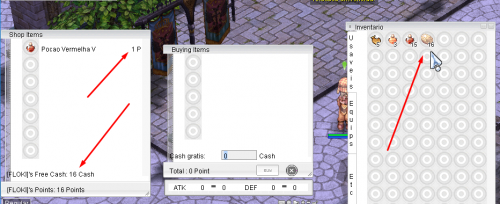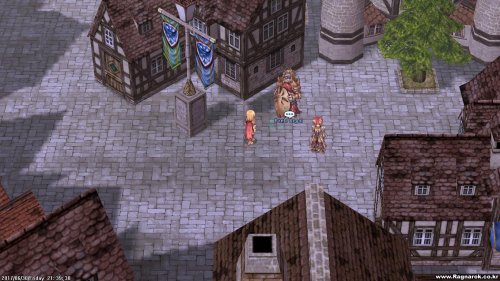Leaderboard
Popular Content
Showing content with the highest reputation on 07/02/17 in Files
-
2 points

[Shop Feature] Tax Collector
Khazou and one other reacted to Juan Meissner for a file
Version 1.0.0
161 downloads
Have you thought about the possibility of creating a system of Politics? Where clan leaders can collect excise taxes on items in a particular region? I created this system to be able to collect a rate of purchases made on NPCs. It's a very basic system but it might be useful to someone. PS: I tried to create a system similar to NST_MARKET, but unfortunately I did not succeed. -
1 point
Version v10
313 downloads
This script provides various array manipulation functions, and more might be added in the future. All of those functions (except the arithmetic ones) work with both integer and string arrays. The start of the array is always implicitly index 0, unless an index is specified, ie @array[index] array_pad(<array>, <size>, <value>) pads the array left or right with <value> until it reaches <size> size. If <size> is negative it will pad left. > returns the number of added entries setarray(.@foo, 1, 2, 3, 4, 5); // initialize the array array_pad(.@foo, 8, 69); // => 3 // array is now: 1, 2, 3, 4, 5, 69, 69, 69 setarray(.@foo, 1, 2, 3, 4, 5); // initialize the array array_pad(.@foo, -8, 69); // => 3 // array is now: 69, 69, 69, 1, 2, 3, 4, 5 array_replace(<array>, <needle>, <replacement>{, <neq>}) finds every occurrence of <needle> within the array and replaces it with <replacement>. if <neq> is true, finds entries that do not match instead > returns the number of changed entries setarray(.@foo, 1, 1, 3, 1, 5); // initialize the array array_replace(.@foo, 1, 69); // => 3 // array is now: 69, 69, 3, 69, 5 array_find(<array>, <needle>{, <neq>}) finds the first occurrence of <needle> within the array. if <neq> is true, finds entries that do not match instead > returns the index, or if none is found returns -1 setarray(.@foo, 1, 2, 3, 4, 5); // initialize the array array_find(.@foo, 3); // => 2 array_find(.@foo, 1); // => 0 array_find(.@foo, 6); // => -1 array_rfind(<array>, <needle>{, <neq>}) like array_find, but finds the last occurrence. if <neq> is true, finds entries that do not match instead > returns the index, or if none is found returns -1 setarray(.@foo, 1, 2, 3, 4, 3); // initialize the array array_rfind(.@foo, 3); // => 4 array_rfind(.@foo, 4); // => 3 array_rfind(.@foo, 6); // => -1 array_exists(<array>, <needle>{, <neq>}) very similar to array_find() but it instead just checks if it exists or not. if <neq> is true, finds entries that do not match instead > returns true or false setarray(.@foo, 1, 2, 3, 4, 5); // initialize the array array_exists(.@foo, 3); // => true array_exists(.@foo, 6); // => false array_count(<array>, <needle>{, <neq>}) similar to array_find() but iterates through the whole array. if <neq> is true, finds entries that do not match instead > returns the total number of occurrences of <needle> setarray(.@foo, 1, 69, 3, 69, 5); // initialize the array array_count(.@foo, 69); // => 2 array_entries(<array>) a wrapper around array_count(). behaves similarly to getaraysize() but does not count holes > returns the number of non-empty entries setarray(.@foo, 1, 2, 0, 0, 5); // initialize the array getarraysize(.@foo); // => 5 array_entries(.@foo); // => 3 array_remove(<array>, <needle>{, <neq>}) finds and removes every occurrence of <needle> from the array, while shifting left. if <neq> is true, finds entries that do not match instead > returns the number of removed entries setarray(.@foo, 1, 69, 3, 69, 5); // initialize the array array_remove(.@foo, 69); // => 2 // array is now: 1, 3, 5 array_reverse(<array>) reverses the array > returns true setarray(.@foo, 1, 2, 3, 4, 5); // initialize the array array_reverse(.@foo); // => true // array is now: 5, 4, 3, 2, 1 array_sum(<array>) iterates through the whole array to perform an arithmetic addition > returns the sum of every entries of the array setarray(.@foo, 1, 2, 3, 4, 5); // initialize the array array_sum(.@foo); // ((((1 + 2) + 3) + 4) + 5) => 15 array_difference(<array>) iterates through the whole array to perform an arithmetic subtraction > returns the difference of every entries of the array setarray(.@foo, 1, 2, 3, 4, 5); // initialize the array array_difference(.@foo); // ((((1 - 2) - 3) - 4) - 5) => -13 array_product(<array>) iterates through the whole array to perform an arithmetic multiplication > returns the product of every entries of the array setarray(.@foo, 1, 2, 3, 4, 5); // initialize the array array_product(.@foo); // ((((1 * 2) * 3) * 4) * 5) => 120 array_quotient(<array>) iterates through the whole array to perform an arithmetic division > returns the quotient of every entries of the array setarray(.@foo, 1, 2, 3, 4, 5); // initialize the array array_quotient(.@foo); // ((((1 / 2) / 3) / 4) / 5) => 0 array_shift(<array>) removes the first entry of the array, while shifting left > returns the value of the removed entry setarray(.@foo, 1, 2, 3, 4, 5); // initialize the array array_shift(.@foo); // => 1 // array is now: 2, 3, 4, 5 array_unshift(<array>, <value>) adds <value> to the start of the array, while shifting right > returns the new size of the array setarray(.@foo, 1, 2, 3, 4, 5); // initialize the array array_unshift(.@foo, 69); // => 6 // array is now: 69, 1, 2, 3, 4, 5 array_pop(<array>) removes the last entry of the array > returns the value of the removed entry setarray(.@foo, 1, 2, 3, 4, 5); // initialize the array array_pop(.@foo); // => 5 // array is now: 1, 2, 3, 4 array_push(<array>, <value>) adds <value> to the end of the array > returns the new size of the array setarray(.@foo, 1, 2, 3, 4, 5); // initialize the array array_push(.@foo, 69); // => 6 // array is now: 1, 2, 3, 4, 5, 69 array_shuffle(<array>) shuffles the array > returns true setarray(.@foo, 1, 2, 3, 4, 5); // initialize the array array_shuffle(.@foo); // => true // array is now: 1, 4, 2, 3, 5 (example, unpredictable) array_unique(<array>{, <threshold>}) allows array entries to appear up to <threshold> times (1 by default) and removes the extraneous ones. useful to remove duplicate entries > returns the number of removed entries setarray(.@foo, 1, 3, 3, 4, 5); // initialize the array array_unique(.@foo); // => 1 // array is now: 1, 3, 4, 5 array_diff(<base array>, <array>{, <array>...}, <result array>) compares the base array against one or more other arrays and fills the result array with the entries in base array that are not present in any of the other arrays > returns the number of entries not found in other arrays setarray(.@base, 1, 2, 3, 4, 5, 6, 7, 8); // initialize the base array // fill the arrays to compare with the base array: setarray(.@foo, 2, 3, 4, 5, 6, 7, 8); // missing "1" setarray(.@bar, 1, 2, 3, 4, 6, 7, 8); // missing "5" setarray(.@baz, 1, 2, 3, 4, 5, 6, 7); // missing "8" // compare foo, bar and baz against base, and fill result: array_diff(.@base, .@foo, .@bar, .@baz, .@result); // => 3 // .@result is now: 1, 5, 8 array_filter(<array>, "<function>") filters the array using a function that is tested against every entries. if the function returns false, the relevant entry is removed and the array is shifted left > returns the number of removed entries function script is_prime { if (getarg(0) <= 1) return false; for (.@i = 2; .@i <= getarg(0) / 2; ++.@i) if ((getarg(0) % .@i) == 0) return false; return true; } setarray(.@foo, 1, 2, 3, 4, 5, 6, 7, 8, 9, 10, 11, 12, 13, 14, 15); array_filter(.@foo, "is_prime"); // => 9 // array is now: 2, 3, 5, 7, 11, 13 array_sort(<array>) sorts the array in ascending order > returns true setarray(.@foo, 2, 1, 8, 4, 5, 7, 6, 3); // initialize the array array_sort(.@foo); // => true // array is now: 1, 2, 3, 4, 5, 6, 7, 8 array_rsort(<array>) sorts the array in descending order > returns true setarray(.@foo, 2, 1, 8, 4, 5, 7, 6, 3); // initialize the array array_rsort(.@foo); // => true // array is now: 8, 7, 6, 5, 4, 3, 2, 1 Requires Hercules of June 24 2017 or newer version -------------------------------------------------------------------------------------- This script was made by me, for The Mana World + Evol. License: public domain (CC0) -
1 point
Version 1.0.0
106 downloads
A PvP Addon where players may fight until the end of the delay configured to earn as much points as possible. The highest points rate will be rewarded, others will too but in a lowest range. Enables first player to configure the game duration at will (5, 10 or 15 minutes), and diffuse announce for players attraction. Configuration enabled: Price to enter, number of player to start the game, duration enabled Command: allowing use of @brboard, to get a score board for each player in game






